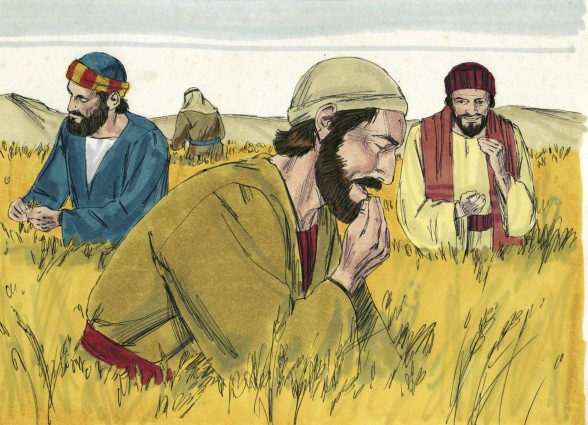There are many reasons to address the subject of the Sabbath, as we’re looking at the law. I was reminded through this study just how many times Jesus performed miraculous healings on the Sabbath, and yet was continually accused of breaking the Sabbath law. Can we learn anything about the Sabbath today from His experience, whether we are currently observing it or not?
First of all, did Jesus keep the Sabbath? Being a devout Jew, as we’ve witnessed so far in His life, I can say with assurance that He did. As a matter of fact, we have it from His own lips in John 15:10: “…I have kept my Father’s commandments, and abide in his love.” KJV And how can we abide in His love too, you ask? The first part of the verse tells us plainly; “If ye keep my commandments, ye shall abide in my love; even as I…”.
Regardless of which day you worship God, it’s possible to lose touch with observing the day properly. Which is exactly the problem the Pharisees had, as they repeatedly accused Jesus of breaking this important Ten Commandment law.
Key Text: “‘The Sabbath was made for man, and not man for the Sabbath. Therefore the Son of Man is also Lord of the Sabbath'” Mark 2:27, 28 NKJV
Note that Jesus declared the Sabbath was made for man, not for the Jews, as some have claimed. It indeed goes all the way back to Creation Week. No doubt Adam and Eve were the first Sabbathkeepers. What a special, joyful communion that must have been with their loving Creator.
Sunday: The Jewish Sabbath?
We read about the creation of the Sabbath in Genesis 2:1-3. Other living creatures, including man, were blessed and told to multiply, but the Sabbath was not only blessed, but sanctified or made holy.
Some may not have thought of the Sabbath as something God created, but it certainly sounds so when you read about it in Genesis. Colossians 1:16 even mentions “…all things created, that are in heaven, and that are in earth, visible and invisible…” The Sabbath, being an element of time and rest, might be considered something “invisible” that God created.
After four hundred years of slavery in Egypt, with enforced labor seven days a week, many of the people of Abraham (the first “Jew”) had no doubt lost sight of the Sabbath. God immediately began teaching them about it through the collection of manna, which was not to be done on the Sabbath. Every week they saw a miracle with the manna not spoiling over that special day.
So, they were not caught by surprise with the Sabbath commandment when the Ten Commandments were delivered to them by Moses from Mount Sinai. They had already begun keeping it again. And God pointed out another reason for their observance of the day. Moses repeated the Commandments in Deuteronomy 5, and the fourth commandment had an added injunction:
“And remember that thou wast a servant in the land of Egypt, and that the Lord thy God brought thee out thence through a mighty hand and by a stretched out arm: therefore the Lord thy God commanded thee to keep the sabbath day.” v. 15 KJV
To Moses and those former slaves, the Sabbath was not only a reminder of creation, but of re-creation, or redemption. God had brought them out of bondage, redeemed them from the enemy.
As spiritual Jews (Galatians 3:29), we are also aware of this double blessing. God created this beautiful planet for us, but He went even further by making us “a new creature” (II Corinthians 5:17).
Discussion Questions: How can we avoid falling into the trap of losing sight of the meaning of the Sabbath, as many of the Jews had during Jesus’ lifetime?
What can you and your family do that will remind you of both meanings of the Sabbath? Keep in mind, how and when we keep it is important, but so is WHY we keep it.
Monday: A Time for Rest and Worship
Did the early church still use the Sabbath as a day of rest and worship?
These verses in the book of Acts may help us see more clearly what the early apostles’ practice was:
- Acts 13:14 “But when they departed from Perga, they came to Antioch in Pisidia, and went into the synagogue on the sabbath day, and sat down.”
- Acts 13:42 “And when the Jews were gone out of the synagogue, the Gentiles besought that these words might be preached to them the next sabbath.”
- Acts 13:44 “And the next sabbath day came almost the whole city together to hear the word of God.”
- Acts 16:13 “And on the sabbath we went out of the city by a river side, where prayer was wont to be made; and we sat down, and spake unto the women which resorted thither.”
- Acts 17:2 “And Paul, as his manner was, went in unto them, and three sabbath days reasoned with them out of scriptures,”
- Acts 18:4 “And he reasoned in the synagogue every sabbath, and persuaded the Jews and the Greeks.”
Discussion Questions: With mass media so prevalent in our day, why should Christians bother with coming together in a church setting to worship every week? Couldn’t we all just stay home and gain a blessing from television or the internet?
Tuesday: A Time for Enjoyment
Isaiah 58:13, 14 perhaps gives us the best instruction on how to keep the Sabbath. It says:
“If you turn your foot away from the Sabbath, From doing your pleasure on My holy day, And call the Sabbath a delight, The holy day of the Lord honorable, And shall honor Him, not doing your own pleasure, Nor speaking your own words, Then you shall delight yourself in the Lord; And I will cause you to ride on the high hills of the earth, And feed you with the heritage of Jacob your father. The mouth of the Lord has spoken.” NKJV
We see from these verses that the Sabbath is meant to be enjoyed by man; it was to be a delight not a burden, as the Pharisees had made it at the time of Jesus, with all their rules and regulations.
One of the many times, the religious leaders tried to accuse Jesus of wrongdoing was when they approached Him about His hungry disciples plucking heads of grain as they walked through a field one Sabbath. Jesus pointed them to the true meaning of the Sabbath and implied that He was authorized, as Lord of the Sabbath, to declare how it was to be kept. See our Key Text–“…the Sabbath was made for man…”.
Discussion Questions: Instead of thinking of things you can’t do on Sabbath, what are some things you CAN do that are difficult to do on other days of the week–things that would draw you closer to God?
How do you strike a balance between making the Sabbath a delight, but also making it not a burden?
Wednesday: A Time for Healing
One of the purposes of the Sabbath is to allow us a time for healing, of our entire being. Spiritual and physical healing take place better in places and times of quiet solitude and communion with God. What places can you think of where quiet and restfulness are encouraged the most? No doubt hospitals, libraries, and churches come to mind. Places to heal our bodies, minds, and spirits.
Is it any wonder then that some of Jesus’ most dramatic healing took place on the Sabbath? Here are some of them:
- Mark 3:1-6 the man with a withered hand in the synagogue
- Luke 13:10-17 the woman bowed over, who couldn’t stand straight for 18 years (also in the synagogue)
- John 5:1-9 the paralyzed man at the Pool of Bethesda
- John 9:1-14 the man blind from birth
For each of these situations, Jesus faced condemnation from the religious leaders, because the events took place on the Sabbath day. Evidently God does not rest from relieving human suffering on any day. Perhaps this is why Psalm 121:4 says, “Behold, he that keepeth Israel shall neither slumber nor sleep.”
Discussion Question: In several healing stories in the Gospel accounts, sick people were looking for Jesus and found Him. But notice that in the above stories, Jesus seems to be looking for and finding the sick and suffering Himself. What does Jesus’ example in finding and healing on the Sabbath day mean to our observance of the day?
Thursday: A New Creation
- We’ve seen how the Sabbath is a reminder of the original Creation Week, as revealed in Genesis.
- It has also been seen as a day of redemption and healing for our sin-sick souls and bodies.
- But there is a future creation that the Sabbath reminds us of: when our whole earth will be made new (Isaiah 65:17), and we will enjoy an eternity with our Maker.
- So it really points to the Second Coming, when His people will receive a new immortal body (I Corinthians 15:54).
One has to recognize the sanctifying power of the Sabbath as a reminder of the entire plan of salvation. No wonder God was so insistent that we remember it. “Remember the sabbath day, to keep it holy.” Exodus 20:8
Discussion Questions: Discuss how the world would be different if man had remembered the Sabbath. How would it impact many of the prevailing philosophies of our time? [atheism, evolution, homosexuality, humanism, abortion, for instance]
How would the Sabbath concept have kept us more focused on God’s plan? Do you think there would be as many interpretations of the Bible today, if the plan of salvation were better understand by all denominations?
Summary
“Jesus, as the Creator of the Sabbath during the Creation week, did not come to nullify Sabbath observance but rather to restore it as a symbol of Creation, as well as Redemption.” ~from the teacher’s quarterly, p. 60
Challenge
Make a mental inventory of your own Sabbath experience. Ask yourself these questions:
- Is God the focus of my worship and thoughts throughout the day?
- Am I being an encouragement to anyone else?
- Am I getting the spiritual blessing I would like out of the day?
What positive changes can you make that will further your goals of Sabbath rest?
Next week: Christ’s Death and the Law











